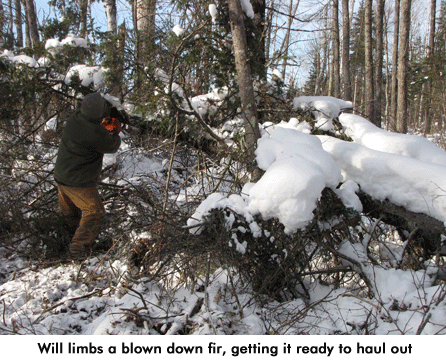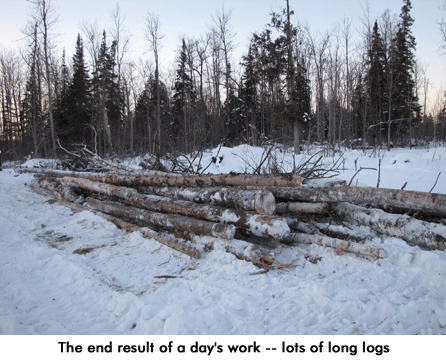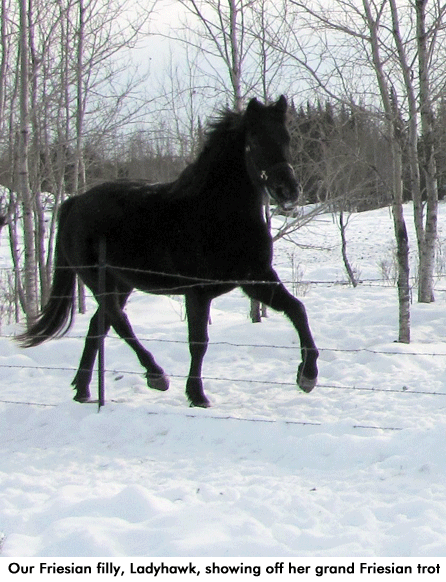While I was busy inside wrapping Christmas packages, writing Christmas cards, baking goodies, and making Holiday fudge, Will was busy down in the woods. We had a lot of blow-down of fir and birch due to the beavers enlarging their pond years ago. The trees had slowly died from too much moisture, fallen down and were creating a huge pile of jack-straws. Before they rotted, and for easier access for our new, yet unfenced pasture, Will decided to get in there with the dozer and clear trails to cut the dead wood out. As the weather was sunny and mild — despite two feet of snow on the ground — he set about doing just that. Working all morning and afternoon he returned home after hauling at least a cord of good firewood out, as well as many future posts for our house front porch and the decorative uprights in each corner of the octagon in the new addition. Yes, some of the wood is starting to rot. But we can still burn it for heat; it’s free and it does get rid of it in a beneficial way. Some people wouldn’t be caught dead burning that wood, but we feel it is a very good way of disposing of it. It cleans out our woods, making way for new growth, heats our house, and the ashes fertilize our garden. Around here, we try to use everything we can that the land provides us. Our horses, donkeys, and mule were happy for entertainment and played up and down the fence while Will drove by with Old Yeller and the long logs. Snow was kicked up, feet flew, and they tore around having great fun.
Readers’ Questions:
Storing foods, canning, and canned recipes
First let me say Merry Christmas to you and yours and bless you for sharing your wealth of knowledge with us newbies! You are an inspiration!
My first question is about vinegars, oil, and shortening storage. Do they go bad? I have heard people say something about oil being rancid, what does that mean? Does it smell funny? How would I tell?
Second question is along the same line on brown and white rice. I know they say it will keep for a long time, but how do you tell when it is bad? Are there signs to look for?
Third question is I guess more of a request. Do you think that you might be able to do a video on canning that chicken? I have never processed meat before and sure would like to see it done before I give it a try. Yep I am chicken.
Fourth question is, I have the Ball book and yours that has all kinds of recipes but I guess I am not imaginative enough to figure out what to do with it afterward. Example, Chow chow. What is this used for or served with? How do I figure this out, just trial and error?
Jennifer Joyner
Huntsville, Alabama
Vinegar that is unopened never seems to go bad. Vegetable and olive oils the same, although I have had opened vegetable oil go rancid after lengthy stays on the shelf. When you open the container, it just plain smells bad. Dip your finger into it and taste it (it won’t harm you). If you go “YUCK!” it’s rancid, no saving it. Unopened shortening stays fine for years, I’ve never had a can go bad. But an opened can, after months on the room-temperature shelf, can get rancid. Again smell it. You can definitely smell the rancidity of it.
White rice will stay fine for years and years. But brown rice — being whole grain like whole wheat flour — will go rancid after several months in an unopened bag, quicker in an opened bag. Again, smell it. You can smell the rancidity. Smell fresh brown rice, then an opened bag of old brown rice. You can definitely smell the difference.
Right now, I can’t do a video on canning chicken or anything else because the wonderful guy, Jay, who used to do it, has moved on. If you have my book, just follow the directions. It is VERY easy and after the first time, you won’t be chicken!
Chow chow is a relish that is used as a side dish to any meal, just like cranberry sauce, corn relish, or chutneys. My advice is to make a small batch of a new recipe, let it store a few weeks to improve the flavor, then open a jar and taste it. Your taste buds will help you figure out how you want to serve it — on a sandwich, as a side dish, or right out of the jar. Cooking and canning are like twins, both of them develop a creative bent in most people. Relax and go with it!
And a VERY MERRY CHRISTMAS TO YOU TOO! — Jackie
Shelf life of homemade bread
I like to bake my own bread but it doesn’t have the shelf life that the store bought does. What can I add to my recipes to keep it from molding?
Kate Nichols
Yuma, Arizona
Sorry, but that’s the benefit of making your own bread — no preservatives to make you sick. To keep your homemade bread from molding, keep it in the refrigerator or freeze the extra loaf in a plastic bag, then take it out to thaw a day before using. — Jackie
Peeling hard-boiled eggs
I was reading about you having a hard time peeling your boiled eggs. My husband taught me this trick: after you crack the shells, use a teaspoon and run underneath it and they’ll come right off.
Marty Rapisarda
Huntington, Massachusetts
I’ll give it a try. But since I started using the 1/4 cup of vinegar in my boiling water, my eggs peel easily and cleanly. Hooray! — Jackie
Storing flour and rice
I’ve been given some new 5-gallon pails that seal and since it gets pretty hot here in summer I’m trying to figure out if after putting my flour and rice in freezer for few days if I could heat flour and rice in oven in open pans till hot and place in hot jars and pressure can, water only in bottom of canner to seal and then place in buckets for long time storage in order to keep out any bugs. Do you think this would work? If the jars seal seems like it would keep even in our 90 degree summers.
Betty Downs
Covington, Georgia
If you freeze your flours before putting into your pails, you should have no trouble with bugs in your flour later on after storage. These bugs (weevils) usually get into flour via eggs that are already in the flour when you buy it. Sometimes the moths find their way into storage containers, such as crocks with not-so-tightly fitting lids. I’ve never had weevils get into any of my storage buckets, even in New Mexico, where I did have trouble with pantry moths in my kitchen. Canning the flour is not necessary, and would only be a lot of extra work for you. — Jackie
Canning bacon
I’ve been interested in canning bacon for quite some time now and saw the article in the latest issue of the magazine (Jan/Feb 2011). We are on a venture for whole and natural foods, and this week, natural bacon is on sale. My concern with canning bacon of this sort is whether canning bacon necessitates the use of of nitrite/ate laden bacon. If I use a natural bacon that does not have the nitrate/ite added, will the canning be sufficient in preserving it?
Michaela Leeper
Rawlins, Wyoming
Yes. The nitrates only preserve the reddish color of meat. Your canned natural bacon will process just fine and keep just as well as bacon with nitrate in it. — Jackie
Canning chicken noodle soup
I’m just double checking to make sure it is ok to put noodles in the chicken soup and then proceed to pressure can. Many websites out there state that it should not be done because the processing time can not be determined with noodles. I went ahead and did it anyway. What do you think?
Jacqueline
Sidney, Nebraska
The reason you shouldn’t put a lot of noodles in chicken or other noodle soup is that they swell and pack together during processing, creating a dense food that may not heat thoroughly in the center for safe canning. However, you can add a few noodles to the chicken soup, as long as you don’t overdo it. You don’t want a product that ends up the texture of condensed soup from a can — one big blob. I’ve canned noodle and rice soups for years…but I also don’t put a lot of pasta or rice in the jars, either. — Jackie
Canning baked beans
Can you can you own homemade baked beans? Can you cook the baked beans, have them for a meal, and then pressure can or waterbath can the rest?
Penny Paskerta
Charlestown, New Hampshire
NEVER, NEVER, NEVER water bath beans or any other vegetable. It is dangerous because you are not processing the food in high enough temperatures to kill potentially lethal bacteria, their spores, and the toxins they produce.
When you can baked beans, it’s best to mix up your soaked beans and seasonings, then can up the larger portion without baking first, then bake up a smaller amount to eat. When you can leftover baked beans, which you CAN do, the beans tend to be quite soft after processing. Most people like canned baked beans that are a little firmer. In any case, pack the beans hot into hot jars and pressure can them at 10 pounds for 65 minutes (pints) or 75 minutes (quarts). If you live at an altitude above 1,000 feet, consult your canning book for directions on adjusting your pressure to suit your altitude if necessary. — Jackie
Coleman lamp mantels
I read somewhere there is a solution to soak Coleman lamp mantels in to increase there durability. Any idea?
Doc
Yuma, Arizona
I seem to remember that one, too. I think it was ammonia. I do remember that I tried it and it didn’t work. To preserve the life of Coleman mantles, handle lanterns gently. Bumping them while carrying or hanging can shatter fragile mantles. So can moths and other flying insects, flying into the lantern globe. With care, your mantles should last for many months before needing to be replaced. I always keep at least two bags of replacement mantles in a kitchen drawer…just in case. — Jackie
Ducks in the garden
I am thinking about fencing in the back 1/4 of our backyard, and growing blackberries and grapes on the fence. Inside the fence would be our garden and fruit trees, (which are already in place). We thought it would be really great to have a couple of ducks back there. Maybe the Pekind ducks we read about in BHM July/Aug 2010, pg. 76. But then I wonder if they would just fly over the fence and fly away. If so, could I just trim the wing feathers, to keep them grounded? And then I thought while they were laying eggs and eating the bugs, and looking cute, would they also eat the sprouts from the seeds in the garden in the spring?
John and Mason Zimmermann
Winder, Georgia
Your plan sounds good to me. You and Mason will have tons of fun with your garden/orchard and the ducks. Pekins are heavy ducks and really don’t usually fly out of a fence. If they should, yes, you can simply catch them some evening and trim the flight feathers on their wings to ground them. But, yes, they WILL also eat your sprouting crops. So it’s necessary to provide temporary fencing to keep them out of the garden from spring planting time until harvest. (They will also often eat your ripe tomatoes!) Ducks are great eaters of garden bugs, so I’d let them in the garden after the seeds have all sprouted and gotten some height on them. Supervise them initially, to make sure your young plants are past “duck salad” stage.
Be sure to provide your ducks with a shelter and make sure your fence is pretty much dog/predator proof. I like to have my poultry inside at night, just for safety’s sake. Owls like to pick off poultry and white ducks are especially vulnerable. — Jackie






I thought there were certain types of wood people didn’t burn in their stoves, do to the extra buildup in the stove pipes. Do you have any problem, and how do you clean the pipes. Can anyone do it, or is it best to hire a professional? I hadn’t seen anyone ask this question, and as much as you use your wood burners, I know you are the person that can answer this question.
TIA
Jacqueline, when I can my chicken soup I don’t add noodles…partly because of the guidelines warning against it, but more because adding noodles makes the soup less versatile, IMO. If I can it with noodles, then the family is stuck with chicken noodle soup…sometimes they want pasta shapes, other times they want rice or potatoes as the starch in the soup.
So, I can it as plain chicken soup, then, when I’m heating it up, I just toss in the craved starch and let it cook while the soup heats. :)
Comments are closed.